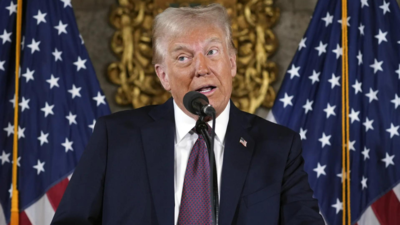The Trump family business announced a new ethics agreement on Friday, allowing deals with private foreign companies— a departure from the stricter agreement US President-elect Donald Trump adhered to during his first presidential term.
Eight years ago, Trump signed an ethics pact that barred deals with both foreign governments and foreign companies. The new agreement, however, prohibits only deals with foreign governments.
The Trump Organization said that it would retain some safeguards from Trump’s first term to prevent his private financial interests from influencing policy. This includes the use of an external ethics advisor to review potential deals. “The Trump Organization is dedicated to not just meeting but vastly exceeding its legal and ethical obligations during my father’s Presidency,” said Eric Trump, executive vice president and second son of Donald Trump, according to a report by Associated Press.
The company announced it had hired William A. Burck, a managing partner at Quinn Emanuel LLP, to review deals for potential conflicts with public policy.
What’s in the agreement?
The new voluntary ethics agreement allows the company to pursue deals with private foreign companies. It also continues restrictions from the previous agreement, such as limiting Trump’s involvement in daily business decisions, restricting his access to financial information, and committing the organization to donate profits from foreign government spending at its properties to the US treasury.
However, the new agreement has sparked concerns about potential emoluments clause violations, particularly given Trump’s business interests in publicly traded ventures. Critics warn of possible attempts to influence Trump through stock purchases in his companies.
Experts’ concerns over recent deal
Ethics experts are alarmed by The Trump Organization’s recent deals involving hotels and golf resorts in countries like Vietnam, Saudi Arabia, and the UAE, fearing Trump’s business interests could shape US policy.
The Trump Organization has also shown interest in deals in Israel and maintains financial stakes in publicly traded companies, including Trump Media & Technology Group—parent of social media platform Truth Social—and World Liberty Financial, a new cryptocurrency venture potentially attracting foreign investment.
Kathleen Clark, a government ethics lawyer at Washington University School of Law in St. Louis, expressed grave concern. “The scale of corruption will be orders of magnitude greater than what we saw in the first Trump administration,” she said, suggesting individuals could attempt to curry favor with Trump through “massive influxes of cash through investments” in his ventures.
Trump’s recent embrace of cryptocurrency, despite prior skepticism, has also raised questions. His family’s cryptocurrency ventures and the appointment of cryptocurrency advocates during his administration have further fueled concerns about potential conflicts of interest.
What federal laws say
Federal law typically prohibits officials from holding financial interests that could affect their policy decisions, but US presidents are exempt from these rules. Nonetheless, most past presidents have followed these ethics guidelines voluntarily—Trump being an exception during his first term.
During his initial presidency, Trump faced controversy over potential conflicts of interest, including an attempt to host a G-7 summit at his Doral, Florida, golf resort and concerns over his Washington, DC, hotel, which attracted lobbyists and foreign officials.




